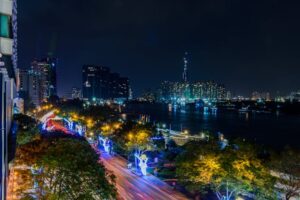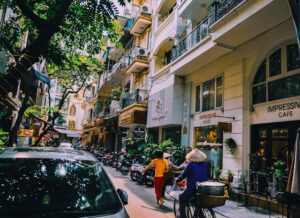Vietnam does not currently offer citizenship or permanent residency through investment alone. Yet, it does have a proposed Golden Visa program, offering 5- to 10-year residency permits to investors, skilled professionals, and long-term visitors.
While not yet in effect, the proposal represents a significant shift in Vietnam’s traditionally conservative immigration policies and signals the country’s intent to compete with regional players like Thailand, Malaysia, and the UAE.
Foreign property ownership is also limited to leaseholds with caps on how much of a given development can be sold to non-citizens.
That means real estate purchases, while potentially part of a qualifying investment portfolio, won’t be sufficient on their own. The government has stated that detailed guidelines including minimum investment thresholds will be finalized prior to rollout, expected in 2026.
This article will discuss the details of the Vietnam 10 year Golden Visa, its plans, speculated eligibility criteria, benefits, and how they compare to broader expat and migration trends in the region.
My contact details are hello@adamfayed.com and WhatsApp +44-7393-450-837 if you have any questions.
The information in this article is for general guidance only. It does not constitute financial, legal, or tax advice, and is not a recommendation or solicitation to invest. Some facts may have changed since the time of writing.

Does Vietnam Have a Golden Visa?
No, Vietnam does not currently have an active Golden Visa program. However, the government has formally proposed a long-term residency scheme that mirrors Golden Visa programs seen in other countries.
This proposal, introduced in early 2024 by the Ministry of Public Security, aims to create a structured visa system offering 5- to 10-year residency for investors, skilled professionals, and long-term non-working residents such as retirees or digital nomads.
As of now, this system remains in development and has not been implemented.
Vietnam 10-Year Golden Visa
The proposed 10-year Golden Visa is designed as part of a three-tier long-term residency system.
This specific track targets foreign investors who contribute capital to Vietnamese businesses or approved sectors.
While full requirements have not yet been published, preliminary outlines suggest that qualifying applicants will need to meet defined investment thresholds, likely in the range of $250,000 to $400,000, and maintain business operations or economic activity within Vietnam.
The visa will allow for family reunification, grant full residency rights for the duration, and may lead to permanent residency after five years.
It does not lead directly to citizenship, and foreign property ownership alone will not qualify. The visa is expected to be introduced by 2026.
How to Obtain the Vietnam Golden Visa
To obtain the Vietnam Golden Visa, you’ll choose a residency track, gather documents, apply online, and complete digital verification once the program becomes active.
The following steps may reflect the anticipated procedure based on official announcements and comparable visa models:
- Select the Appropriate Visa Track
The proposal includes three long-term residency categories:- Investor Visa – 10-year residency, with eligibility for permanent residency after 5 years
- Golden Visa – 5- to 10-year residency for long-term visitors (e.g., retirees, digital nomads)
- Talent Visa – 5-year renewable residency for professionals in high-demand sectors
- Prepare Required Documentation
Applicants will likely need to submit the following:- A valid passport (minimum validity of 6–12 months)
- A police clearance certificate from the applicant’s country of residence
- Proof of health insurance or a medical certificate
- Financial or professional documentation, depending on the selected track
- Any required translations and notarizations of documents
- Submit the Application Online
The application process is expected to be fully electronic, with submission and verification conducted via Vietnam’s immigration portal. Pilot implementation will likely begin in major cities such as Ho Chi Minh City, Hanoi, Da Nang, and Phu Quoc. - Digital Processing and Issuance
Once approved, applicants will receive their residency permit or visa digitally. Biometric data and other verification procedures may be required either at entry or upon issuance.
Vietnam Golden Visa Requirements

While final regulations for golden visa in Vietnam have yet to be published, preliminary information from government sources and immigration service providers allows for a reasonable projection of the program’s likely requirements.
General Requirements (All Visa Categories)
- Valid passport with sufficient remaining validity
- Clean criminal record
- Health insurance or medical clearance
- Completed visa application with biometric-style photographs
- Translated and certified copies of all official documents
Investor Visa Requirements (10-Year Residency)
- Minimum capital investment, likely in the range of USD 120,000–150,000 (VND 3 billion or more), consistent with current DT3 visa standards
- Evidence of investment in a registered Vietnamese enterprise or government-approved sector
- Business registration certificates, bank statements, and proof of fund transfer
- Ongoing business operations in Vietnam
Talent Visa Requirements (5-Year Renewable)
- Professional qualifications in key sectors such as technology, healthcare, education, or the arts
- Employment contract, academic collaboration, or institutional affiliation within Vietnam
- Proof of professional achievement, such as publications, patents, or awards
Long-Term Visitor or Retirement Visa Requirements (5–10 Year Residency)
- Proof of stable income or pension sufficient to support residency in Vietnam
- Evidence of housing arrangements (e.g., lease agreement or property ownership)
- Statement outlining purpose of stay and residency plan
To clarify once more, the final details have yet to be published. As such, any speculation regarding the application process and its requirements should be taken with that in mind.
Can my spouse and children be included in the application?
The proposed golden visa framework in Vietnam includes provisions for dependent visas, allowing spouses and children to reside in Vietnam under the primary applicant’s visa category.
Does the investment visa lead to permanent residency or citizenship?
For investor visa holders in Vietnam, permanent residency may be granted after five years of continuous, compliant residency. However, Vietnamese citizenship will not be granted under this program and remains subject to separate naturalization procedures.
These requirements are based on the current proposal and may be adjusted prior to the program’s official launch. Nonetheless, they provide a practical preview of what applicants can expect when Vietnam’s Golden Visa becomes available.
Can I retire in Vietnam using the Investor Visa?
Not directly. The Vietnam Investor Visa is designed for individuals actively investing in Vietnamese enterprises or government-approved sectors.
It typically requires proof of capital contribution, business registration, and ongoing economic activity. As such, it is not intended for retirees who do not plan to engage in business operations.
However, Vietnam’s proposed Golden Visa framework includes a separate long-term residency track that may be suitable for retirees.
This long-term visitor category, still under development, aims to accommodate individuals with stable income or pensions, housing arrangements in Vietnam, and no intent to work.
While details are pending, this retirement-eligible track would likely offer 5- to 10-year residency and may require proof of financial self-sufficiency and health insurance.
As of now, Vietnam does not have a formal retirement visa. Retirees commonly use renewable 3-month or 1-year visas (typically through business sponsorship or spousal arrangements), but these options do not offer long-term residency rights or legal pathways to permanent residency.
Will the Vietnamese golden visa be a good option for expats?
Right now, Vietnam’s golden visa is still in the proposal and pilot stage, without fixed thresholds or nationwide rollout. That means anyone calling it a straightforward residency route is, at best, premature.
Unlike the well-oiled long-stay programs in neighbors like Indonesia, Thailand, or Malaysia, Vietnam hasn’t yet announced confirmed investment floors, guaranteed length of stay, and gave no clear permanent residence pathways.
That said, the potential is real. If the government implements the Tourism Advisory Board’s plan for three long-term visa lanes, it could be quite competitive.
Vietnam is already one of the region’s most attractive destinations for expats thanks to its low cost of living, strong economic momentum, and relatively easy social integration. Add a clear, accessible residency pathway, and it could give Thailand’s privilege visa or Indonesia’s investor scheme a serious run for their money.
The decisive factor will be the fine print. If Vietnam keeps the barriers to entry lower than its neighbors, like requiring a smaller investment or offering longer validity periods without steep fees, it becomes a strong contender.
If it mirrors high-threshold programs like Singapore’s, it risks pricing itself out of its own natural advantage: affordability.
Is Vietnam a Good Investment?
Vietnam is widely regarded as a favorable destination for foreign investment, particularly in manufacturing, logistics, technology, and renewable energy.
It boasts one of the fastest-growing economies in Southeast Asia, with strong GDP growth (averaging 6–7% over the past decade), a young labor force, and rising domestic consumption.
Key advantages include:
- Membership in major trade agreements (CPTPP, RCEP, EU-Vietnam FTA)
- Competitive labor costs and strategic location within global supply chains
- Government incentives in Special Economic Zones and high-tech sectors
- Increasing openness to foreign ownership in various industries
However, there are limitations. Foreigners cannot own land and may only purchase certain types of real estate on 50-year leaseholds, subject to strict quotas.
Regulatory transparency, bureaucratic inefficiencies, and corruption remain concerns for foreign investors. Additionally, foreign real estate ownership does not currently provide a legal basis for long-term residency.
In short, Vietnam offers strong investment potential particularly for active business operations though it remains less accessible than countries with more established investor immigration systems.
It is highly recommended to seek the services of an expat financial advisor who is familiar with Vietnam for more thorough guidance.
Pained by financial indecision?

Adam is an internationally recognised author on financial matters with over 830million answer views on Quora, a widely sold book on Amazon, and a contributor on Forbes.



